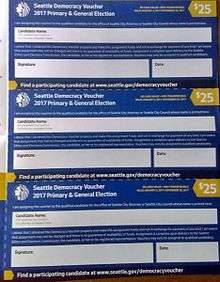Democracy voucher
A democracy voucher is a method of public financing of political campaigns used in municipal elections in Seattle Washington, in the United States.
Overview

The "democracy voucher" program was approved in a 2015 citywide referendum. Municipal elections in 2017 will be the first year the program will be implemented.[1][2] It is the first program of its kind in the United States.[3]
Under the program, each registered voter in Seattle will annually receive four $25 vouchers which they are eligible to assign to any eligible candidate, or candidates, standing for election to municipal office. To be eligible, candidates must
- have already raised between $4,000 and $6,000 from a minimum number of donors;
- agree to campaign finance restrictions including accepting no more than $250 of non-voucher funds from any individual contributor (or $500 for candidates standing for the office of mayor), and
- agree to cap campaign spending to a statutorily determined limit. In addition, participating candidates must not receive any contributions from a person or organization with more than $250,000 in service contracts with the city's government. Persons who are not eligible to vote, such as permanent residents, can also apply to receive, and assign to candidates, democracy vouchers.[1][4][5]
The program is funded by a $3 million citywide increase in the real estate tax. The system is "first come, first served", with only the first 47,000 vouchers assigned by voters being honored.[3]
Support and criticism
Supporters have said the program will increase the involvement of citizens in election campaigns by increasing the percent of the city which donates money to political campaigns from a current level of less than 2 percent to an anticipated level of between 10 and 15 percent, as well as limit the influence of special interests.[3]
Critics have claimed that, because the vouchers will be distributed ten months before the general election and are assigned on a "first come, first served" basis, the program will largely benefit incumbent political candidates rather than challengers, as challengers typically launch their campaigns at a later date than incumbents. As a result, incumbents may receive all funds from the program, with available money having been completely depleted by the time challengers are able to organize and mount campaigns.[3]
See also
References
- 1 2 Young, Bob (November 3, 2015). "'Democracy vouchers' win in Seattle; first in country". Seattle Times. Retrieved December 10, 2016.
- ↑ "Democracy vouchers coming to Seattle mailboxes soon". KING-TV. December 7, 2016. Retrieved December 11, 2016.
- 1 2 3 4 Berman, Russell (November 10, 2015). "Seattle's Experiment With Campaign Funding". The Atlantic. Retrieved December 10, 2016.
- ↑ "Democracy Voucher Program: How to Qualify as a Candidate" (PDF). seattle.gov. City of Seattle. Retrieved December 10, 2016.
- ↑ Ryan, John (October 25, 2016). "$100 in Monopoly money—and just maybe, a better democracy—headed your way, Seattle". KUOW-FM. Retrieved December 10, 2016.
